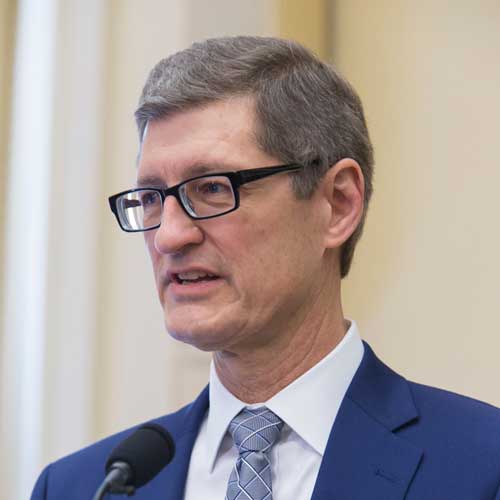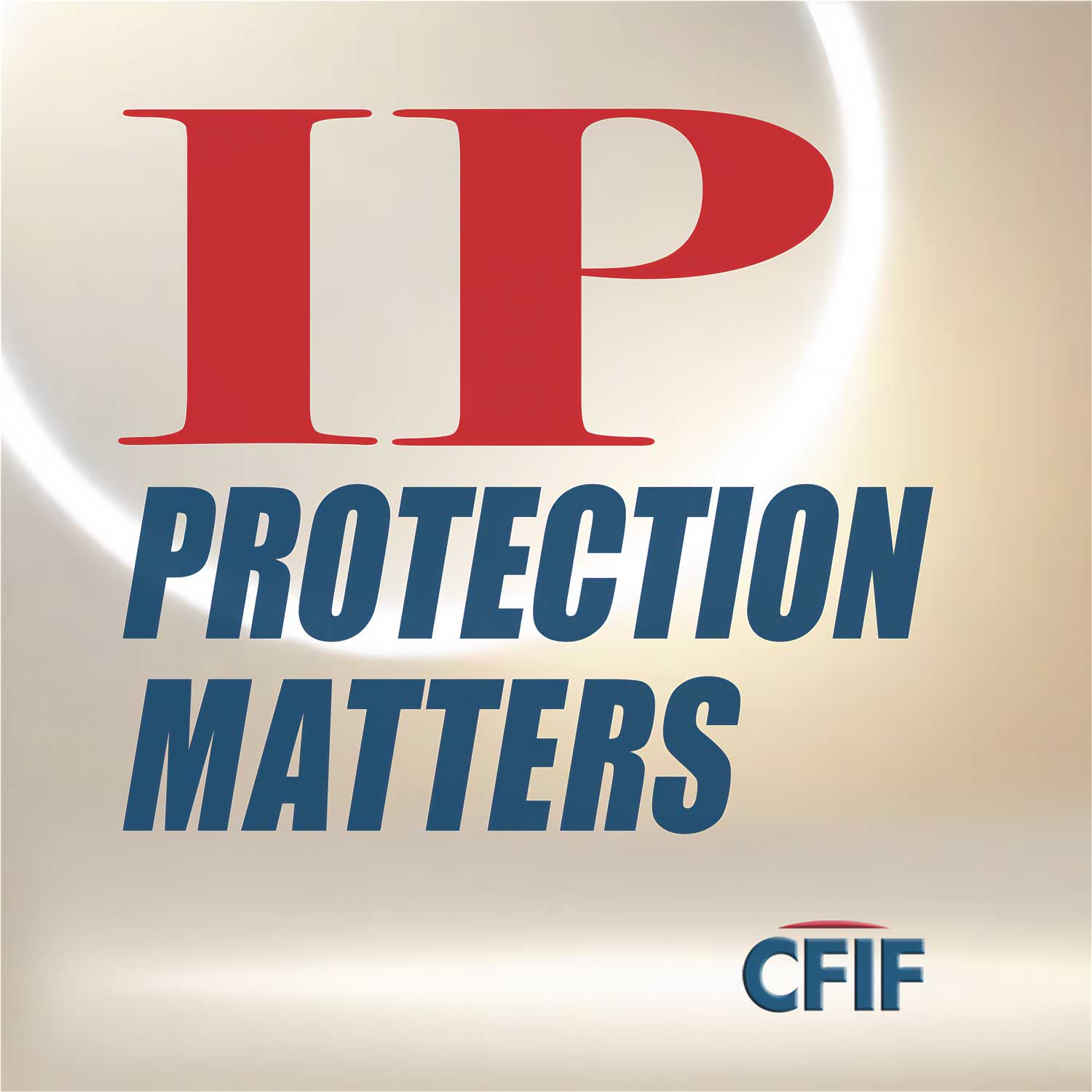

Transcription
Giachino (00:05.0130 - 00:20.0719)
Welcome to IP Protection Matters. My name's Renee Giachino. I'm with the Center for Individual Freedom. Joining us now is James Edwards. He's the Founder and Executive Director of Conservatives for Property Rights. Jim, thank you so much for joining us today. We appreciate it.
Edwards (00:20.0729 - 00:28.0350)
Thank you, Renee. It's great to be with you, and I appreciate that CFIF is a member of Conservatives for Property Rights Coalition.
Giachino (00:28.0629 - 00:35.0709)
Well, on that note, would you take a moment please and tell the listeners about Conservatives for Property Rights.
Edwards (00:36.0180 - 01:40.0629)
It is a coalition of about 20 or so conservative, center-right organizations. Free-market organizations. Kind of spanning the conservative movement in each of their orientations. And the purpose is to stand for property rights in all of the forms that property takes. So that means we're, you know, concerned about eminent domain. We're concerned about takings, regulatory or otherwise. We're concerned about the expansion of land grabs by the government and the attempt to expand it by way of Lotus. And we're concerned about taking through taxation. And we're concerned about intellectual property as well. Property that someone creates, that's protected by some intellectual property form. So that's important to protect as well.
Giachino (01:40.0930 - 01:56.0080)
We firmly believe that IP protection matters. And so for folks out there who may not understand this as deeply, and I'll put myself in that category as well, why should we care about intellectual property protections?
Edwards (01:56.0519 - 03:17.0845)
Well, because it comes down to, yes, a lot of patents and copyrights are owned by corporate entities. But that doesn't mean it's not important property. All intellectual property is is property that did not exist prior to someone writing it, filming it, developing it, discovering it, inventing it and turning it into some tangible thing. So it's something - even if you're looking at it as like a computer implemented invention, still writing the code in such a way, what you're protecting with a patent as opposed to a copyright would be the functionality, what it does. So that's what it is. That issue is property that someone came up with. It's brand new property. So all the IP is doing is discerning where those boundaries lie - the metes and bounds of the new property. And so the copyright, the patent, the trademark, those are basically deeds to property. So think of it in the same sense as your deed on your home or your car.
Giachino (03:18.0304 - 03:49.0869)
So I think a lot of people, and conservatives generally, all agree that real property rights must be afforded strong protections. What you talked about, you know, holding a deed, the metes and bounds. And we know that strong property rights are critical to our economic strength. But when it comes to intellectual property, there are some conservatives and libertarians who are going to argue that it shouldn't be afforded those same strong protections. That IP protections are actually anti-competitive. Why are they wrong?
Edwards (03:50.0369 - 06:41.0399)
They're wrong because, if you look at the facts, there's no way that someone is going to invent something that's really involved or sophisticated, or be able to develop something that's foundational - say a semiconductor chip that is new for 6G technology for your next-generation of smartphones, for instance. Or someone's not going to invent the next cure to cancer or to something like Alzheimer's. Those strains of long-term, the trial-and-error type foundational inventions, don't take place if you don't have secure property rights.
And the important thing to remember is that with intellectual property, you're talking about exclusive rights for a limited duration. So the term of the patents is 20 years. The term of a copyright is like 70. So what you have is limited duration of the exclusivity.
But in the terms of patents, particularly ... you get something called the patent bargain. The inventor, through the patent application, which is what the patent is granted on, is what discloses the secret sauce. So they're giving up the knowledge of how to make this thing and make it work. And that means anybody could take that and infringe that patent as soon as they get that patent published. So that's at risk.
That's why exclusivity and having the ability to enforce your exclusivity for that limited duration - and in most instances it doesn't make up the R&D costs and a lot of the expensive inventions. But certainly you cannot expect somebody to have exclusivity on paper that they can't enforce. That's just nonsense, to think somebody's going to do that. And you can ask any inventor who has faced an infringer, and they've come to the realization, you know, this is, this really means something. Either you can enforce your rights or you can't. And it's important to be able to enforce them from a property rights perspective, but also from an economic incentive perspective.
Giachino (06:41.0790 - 06:50.0410)
And so that I think sums up pretty much how important intellectual property rights are to a healthy function society. Isn't that right?
Edwards (06:50.0790 - 07:20.0880)
It is. And something like 40% of the jobs in America are supported by intellectual property-centric and dependent businesses. So this is crucial for jobs, for economic growth, for growing the pie and for expanding the ability to continue advancing our knowledge and technology.
Giachino (07:20.0890 - 07:32.0549)
So I think some of that is, is perhaps data ... you know, the US Patent and Trademark Office documents the economic impact of IP-intensive industries. Can you shed a little bit more light on this for us?
Edwards (07:33.0589 - 08:24.0109)
Well, the patent office does keep statistics on the economic benefits to society of patent-intensive industries. Now, I'm trying to remember off the top of my head beyond what I said. It's like 40% of the jobs. Then there's, I cannot remember the figures, but I mean billions and billions of dollars worth of economic growth, um, output, and those jobs - for sure IP-intensive industry jobs - do pay superior salaries and generally provide better benefits to their workers. So it makes a difference and it's important,
Giachino (08:24.0440 - 09:20.0739)
Right, and I know that in one of the pieces that I read that you authored back on World IP Day - and for folks who want to read all of these numbers and I know there are lots of them, they can find it on your website at property-rts.org or just go ahead and Google Conservatives for Property Rights. But as you mentioned, these industries provide over 40 million U.S. jobs. They support another 15 million jobs just in the supply sector, as you've noted. So critically important. And I think numbers can tell a very, very big story here. And it's interesting that the U.S. Patent and Trademark Office documents this, puts this out. But in other ways, can you discuss with us the ways in which the USPTO procedures can even boost or weaken those patent protections.
Edwards (09:21.0169 - 12:56.0005)
Yes. The, the patent office has been turned into something of a two headed being. One is the angel, being the good side that promotes patents and invention and secures rights. And the other is the devil, or the demon, and it is the one that takes away those rights.
And so what happened around about 2011 was a law called the America Invents Act. It, it really did a lot of damage, because it established something that has been fairly prominent in foreign IP systems, but not in America. And we dumbed down our system to look more like a European or Japanese system, rather than forcing them to harmonize with us and raise the quality of their system.
So what they did was establish an adversarial panel. It's kind of like court, but before administrative law judges. So they're bureaucrats, they're not judges. They're not appointed by the president and confirmed by the Senate like real Article III judges are. They are just bureaucrats, working for the patent office. And so these so-called judges, administrative judges or patent judges, are ... here's the way it works.
Typically an inventor will claim infringement of his patent against someone or some company. And that company most of the time is larger - this is asymmetrical so smaller versus larger - so they bring infringement charges in court and then - in real court - and then the infringer counters with challenging the validity of the patent. They do that in the court, the Article III court, but they also open another front in this war - lawfare - of challenging the patent administratively in the Patent and Trademark Office. This is called a Patent Trial and Appeal Board, PTAB. And PTAB is where these bureaucrat judges quote unquote, will hear these challenges.
The way it's implemented is so biased in favor of canceling the patent. The infringer wins 84% of the time. So, this is outrageous and completely lacking in due process and fairness. The entities that bring these charges have many bites at the apple administratively. If you lose in court, that it's proven that you are in fact infringing this guy's patent and the patent is valid if a real court decides that, you're going to face consequences. If the infringer, who typically wins in PTAB, just erases some or all of the patent claims - so it's destroying property, destroying property rights - that property and that knowledge is out there, but there's no way that the inventor or patent owner an protect it anymore after PTAB gets through with it.
Giachino (12:56.0424 - 13:32.0150)
I think you've identified what I believe to be some of the biggest threats to IP protection today. I mean, that was going to be my next question. But you have, not that you saw the list of my questions, but I think you very clearly already answered that. We put some of that squarely into the lap of PTAB.
Our guest is Jim Edwards, Founder and Executive Director of Conservatives for Property Rights. Jim, before I let you go, if you would just once again sum up for us, the conservative case for strong IP protections.
Edwards (13:32.0340 - 14:35.0020)
Well, conservatives believe in property rights, generally believe in property rights and the rule of law. What we advocate at CPR is that those rights of property that apply to our land, our finances and all else - other forms of personal property or otherwise - they should apply and be sustained and strengthened for those creative and inventive works. Because they are property too and more so, moreover, they are property that is newly created. It didn't exist before, unlike land or something. So it's important to conservatives. It should be important to conservatives. As an individual right, as a matter of law, as a matter of fairness, as a matter of justice. So, and by the way, as the vehicle for furthering our economic growth.
Giachino (14:35.0210 - 14:50.0380)
100% I mean as you've talked about in our discussion today, it's critically important to that healthy functioning society and has significant economic impacts, both within the United States and even globally.
Edwards (14:50.0500 - 14:51.0380)
Yes.
Giachino (14:51.0400 - 15:11.0380)
Well, Jim, thank you so much for your time today. We greatly appreciate it. Our guest, James Edwards, Founder and Executive Director of Conservatives for Property Rights.
